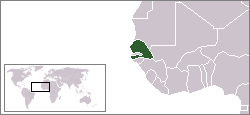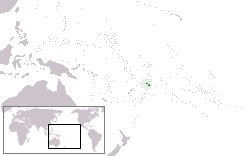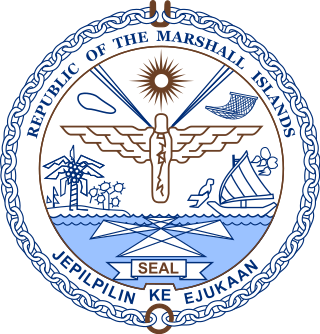Related Research Articles

The Legislative Assembly, also known as the Parliament of Samoa, is the national legislature of Samoa, seated at Apia, where the country's central administration is situated. Samoan Parliament is composed of two parts: the O le Ao o le Malo and the Legislative Assembly.

Human rights are largely respected in Switzerland, one of Europe's oldest democracies. Switzerland is often at or near the top in international rankings of civil liberties and political rights observance. Switzerland places human rights at the core of the nation's value system, as represented in its Federal Constitution. As described in its FDFA's Foreign Policy Strategy 2016-2019, the promotion of peace, mutual respect, equality and non-discrimination are central to the country's foreign relations.
Nauru is a small island country in the South Pacific. With a population of 13,649 it is the world's least populous independent republic. Nauru's government operates under its constitution, part two of which contains 'protection of fundamental rights and freedoms.' The Human Rights Council (UNHRC) carried out Nauru's Universal Periodic Review (UPR) in January 2011. The review was generally favourable with only a few areas of concern.

Lesbian, gay, bisexual, and transgender (LGBT) people in Senegal experience legal persecution. Senegal specifically outlaws same-sex sexual acts and, in the past, has prosecuted men accused of homosexuality. Members of the LGBT community face routine discrimination in Senegalese society.
Human rights in Bhutan are those outlined in Article 7 of its Constitution. The Royal Government of Bhutan has affirmed its commitment to the "enjoyment of all human rights" as integral to the achievement of 'gross national happiness' (GNH); the unique principle which Bhutan strives for, as opposed to fiscally based measures such as GDP.
The Universal Periodic Review (UPR) is a mechanism of the United Nations (UN) Human Rights Council (HRC) that emerged from the 2005 UN reform process. Commonly referred to as the UPR, it was established by General Assembly resolution 60/251 of 3 April 2006, the UPR periodically examines the human rights performance of all 193 UN Member States. It is intended to complement, not duplicate, the work of other human rights mechanisms, including the UN human rights treaty bodies. This is the first international human rights mechanism to address all countries and all human rights. The Working Group on the UPR, which is composed of the HRC's 47 Member States and chaired by the HRC President, conducts country reviews.

Lesbian, gay, bisexual and transgender (LGBT) people in Samoa face legal challenges not faced by non-LGBT people. Same-sex sexual acts are illegal, punishable by up to seven years imprisonment, but the law is not enforced.
Tonga is a constitutional monarchy with a population of approximately 130,000. Politics and the economy are dominated by the king, the nobility, and a few prominent commoners. Economic, social and cultural rights are generally well respected. There are, however, a number of issues concerning protection of civil and political rights, particularly freedom of expression, and rights to political participation. Violence against women is a serious issue.
The Universal Periodic Review (UPR) is a state monitoring mechanism of the United Nations Human Rights Council (HRC). It was established by General Assembly resolution 60/251 in 2006 to periodically review the protection and promotion of human rights in each of the 193 United Nations (UN) Member States. New Zealand has been reviewed twice via the UPR in 2009 and 2014.
Samoa, officially the Independent State of Samoa, has a population of approximately 188,000 people. Samoa gained independence from New Zealand in 1962 and has a Westminster model of Parliamentary democracy which incorporates aspects of traditional practices. In 2016, Samoa ratified the Convention on the Rights of Persons with Disabilities CRPD and the three optional protocols to the CRC
The Republic of Vanuatu is a parliamentary democracy with a population of approximately 326.000. The Constitution of Vanuatu is supreme law and sets out the legal framework which deals with the respect of human rights.
Tuvalu is a small island nation in the South Pacific, located North of Fiji and North West of Samoa. The population at the 2012 census was 10,837. Tuvalu has a written constitution which includes a statement of rights influenced by the United Nations Universal Declaration of Human Rights and the European Convention on Human Rights. While most human rights in Tuvalu are respected, areas of concern include women’s rights and freedom of belief, as well as diminishing access to human rights in the face of global warming. The latter has played a major role in the implementation of human rights actions in Tuvalu given its geographical vulnerability and scarce resources.
The Republic of Uruguay is located in South America, between Argentina, Brazil and the South Atlantic Ocean, with a population of 3,332,972. Uruguay gained independence and sovereignty from Spain in 1828 and has full control over its internal and external affairs. From 1973 to 1985 Uruguay was governed by a civil-military dictatorship which committed numerous human rights abuses.
Violence against women in New Zealand is described as the kinds of violence disproportionately affecting women compared to men, due to factors of ongoing gender inequality in society. The New Zealand government and justice system view efforts to prevent and deal with violence against women as a priority of New Zealand legislation and the criminal justice system.
As prescribed in the Constitution of Tokelau, individual human rights are those found in the Universal Declaration of Human Rights and reflected in the International Covenant on Civil and Political Rights. When exercising these rights, there must be proper recognition of the rights of others and to the community as a whole. If an individual believes their rights have been breached they may go to the Council for the Ongoing Government who may make any appropriate order to protect that individual’s rights. There have been no such complaints to date.

The Marshall Islands is a country in the Pacific spread over 29 coral atolls, with 1,156 islands and islets. It has an estimated population of 68,480 and is one of the sixteen member states of the Pacific Islands Forum. Since 1979, the Marshall Islands has been self-governing.
Faʻatino Mataafa Utumapu is a disability rights activist from Samoa.
Tuvalu has been slow to deal with problems that people with a disability face in the country. Since 1978, the government of Tuvalu has been slow to create policy and laws for people with disabilities. In addition, few studies have been done to assess the scope of the issue on the islands. The first comprehensive study of people with disabilities in Tuvalu was done in February 2017.
Human Right Concern Eritrea, also known as Human Rights Concern–Eritrea, is an Eritrean human rights organisation based in the United Kingdom and founded by Elsa Chyrum.
References
- ↑ "Samoa National Population and Housing Census 2006". sbs.gov.ws. Archived from the original on 2010-03-08.
- ↑ Universal Periodic Review: Summary of Stakeholder Submissions: Samoa A/HRC/ WG.6/11/WSM/3 (2–13 May 2011), para 7, 12-13, 15-16, 21, 27-29
- 1 2 Universal Periodic Review: Report of the Working Group on the Universal Periodic Review: Samoa A/HRC/WG.6/11/WSM/1 (2–13 May 2011), para 2, 11-12, 43-44, 46, 49, 51-53, 57, 69, 70-71
- ↑ Fruean, Adel (2018-11-16). "Club supports disability organisation". Samoa Observer. Retrieved 14 December 2020.
- ↑ Soloi, Seia (2017-02-21). "Pacific Conference on Disability begins". Samoa Observer. Retrieved 14 December 2020.
- ↑ Samoa at the Paralympics on paralympic.org